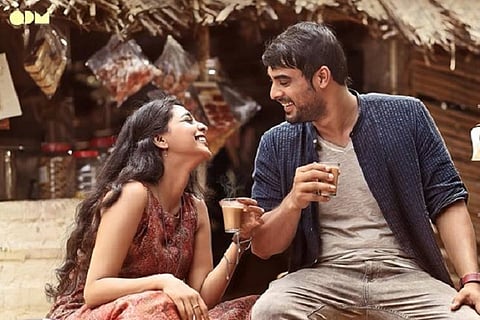

It’s a crucial audition for Aparna. She is a bit flustered by the appearance of actor Aparna Balamurali, who is in for the same role. As the actor tries to make small talk, she excuses herself to go to the washroom and calls Mathan—“Just praise me. Just make me feel better. I need it now.”
He goes on a verbal rampage about her beauty, talent and fighting spirit. But when that doesn’t buck her up, he loses it—cutting straight to the uncomfortable truth (she desperately needs to prove a point to the world). As tears trickle down her cheeks, she wipes her face and smiles—“Yes, I’m better now.”
During another instance, when she is tired and ravenous after a long day and having to listen to her roommate's problems, Mathan beckons her for a hot cup of Boost. This, on the day she meets him after a long gap following their break up.
Mayaanadhi is about this man and woman, about Appu and Mathan who are fastened to each other’s souls. They aren’t fairy-tale lovers declaring undying love for each other. It’s a weird love affair—wildly passionate, deep, and volatile in turns. It’s a romance where the intensity doesn’t hit you until after a long time.
Written by Syam Pushkaran and Dileesh Nair, the Aashiq Abu-directed Mayaanadhi begins in Kodaikanal. Leading man Mathew (Tovino Thomas) is part of a gang involved in illegal money transactions. But the deal goes for a toss when the cops barge in and kill the men.
Mathew manages to flee but accidentally shoots a cop. The Tamil-speaking cops are on his trail even as he escapes to Kerala. On a parallel track we are introduced to Aparna, the woman tucked inside his phone gallery—a struggling actor and model. Mayaanadhi trails their journey together.
Aparna (Aishwarya Lekshmi) is the post-modern pragmatic middle-class city girl. She is drawn with a lot of realism. When the casting director (Unnimaya Prasad) at an audition sneers at her and calls her “plastic”, Appu quickly hides her resentment, lowers her guard, and tries to be herself. When her famous actor friend uses her as a sidekick of sorts (putting down her used garments and two-bit roles), Appu takes it all, again without showing her indignation. She is someone who finds it difficult to say ‘no’ to people.
It’s only with Mathan that she seems to be herself—she snubs, taunts, and shuts the door on him. Yet he keeps coming back to her, like a lost puppy. Mathan, on the other hand, is helplessly in love with her—he keeps gazing at her pictures on his phone. Even with the cops hot on his heels, Appu remains foremost on his mind. Yet the relationship oddly remains a two-way street despite Appu taking him for granted.
A lot of stereotypes are debunked in this male-female dynamic. It’s Appu who calls the shots, including in matters of physical intimacy. He is the more traditional of the two. After a particularly wild lovemaking session, he suggests settling down in Dubai and she tells him—“Sex isn’t a promise.” For her, it’s just a happy, celebratory act after a successful audition, while Mathan considers it as the final deal for marriage.
How beautifully and wantonly the ancient theory of chastity (especially on celluloid) being the sole purview of women is stirred up in that one statement. Humour is infused nicely at some junctures. The admaker who explains to Appu (in broken English) that it was Arvind Swami in Bombay who took up the “first blue whale challenge.” The actor friend who goes ballistic when she sees a shot of her exposed navel and the director who whines when asked to chop the portion. The young and upright cop who is recently married and finds himself being taken for a ride by his seniors.
Then of course come the usual stereotypes—the coy transgender make-up artist, the over-enthusiastic manager of the actor, the ambitious and sly actor(Leona Lishoy).
Mayaanadhi has some delectable night shots (Jayesh Mohan is the cinematographer). The auburn ebony colour tone adds a depth and mystique to the romance, helped amply by the music of Rex Vijayan and the vocals of Shahabaz Aman.
Aishwarya Lekshmi is the heart and soul of the film—Aparna required an actor who looked sensual, vulnerable, and resolute. Emotions flit easily across her face—as a lover, the struggling model, the mortified daughter. She is a natural. Tovino has just poured himself into the shape of Mathan (his eyes show immeasurable love and I liked the way he tries to hide his hurt) and it’s easily his career best act.
Mayaanadhi is a modern romance with all its trappings—yet the intensity cannot be more searing. Kelly Clarkson said it right—what doesn’t kill you makes you stronger. He must have been talking about Aparna.